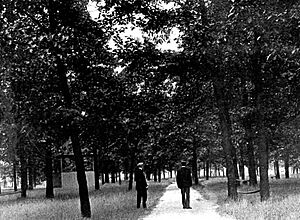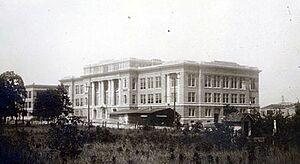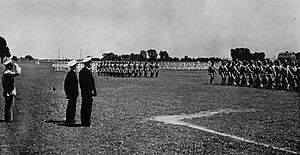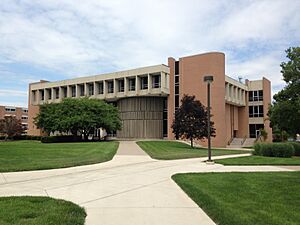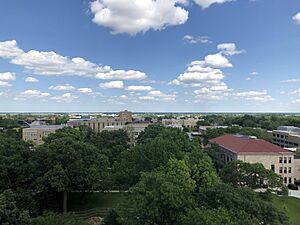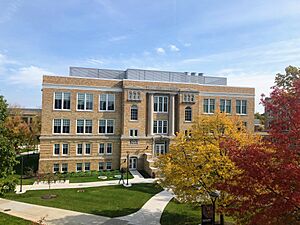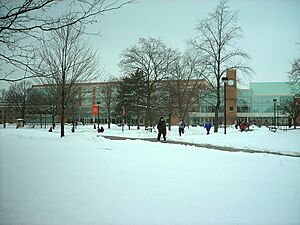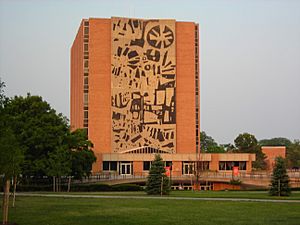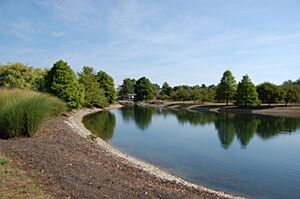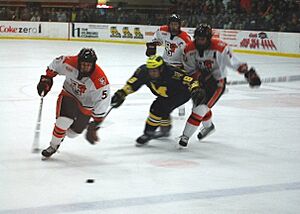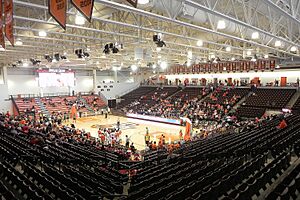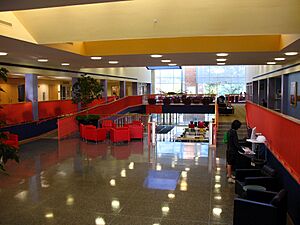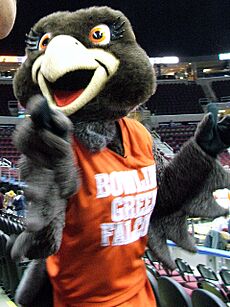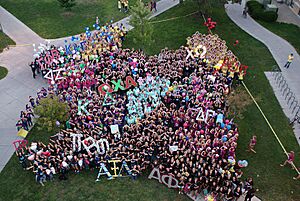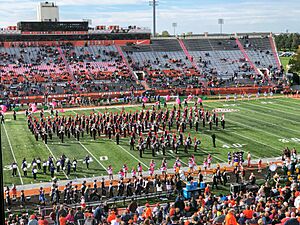Bowling Green State University facts for kids
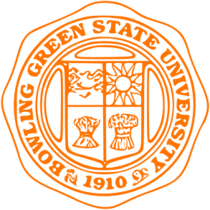 |
|
|
Former name
|
Bowling Green State Normal School (1914–1929) Bowling Green State College (1929–1935) |
|---|---|
| Type | Public research university |
| Established | September 27, 1910 |
|
Parent institution
|
University System of Ohio |
| Endowment | $155.7 million (2020) |
| President | Rodney K. Rogers |
| Provost | Glenn Davis |
|
Academic staff
|
1,982 (1,109 faculty, 873 graduate assistants) |
|
Administrative staff
|
1,916 |
| Students | 20,395 (Bowling Green) 22,986 (all campuses) |
| Undergraduates | 19,183 (on campus) 2,500 (Firelands) |
| Postgraduates | 3,803 (all campuses) |
| Location |
,
Ohio
,
United States
41°23′N 83°38′W / 41.38°N 83.63°W |
| Campus | College town, 1,338 acres (5.41 km2) |
| Colors | Orange and brown |
| Nickname | Falcons |
|
Sporting affiliations
|
NCAA Division I – MAC |
| Mascot | Freddie and Frieda Falcon |
 |
|
Bowling Green State University (BGSU) is a large public university in Bowling Green, Ohio. Its main campus is about 15 miles south of Toledo, Ohio. The university is known for its programs in science, education, arts, business, and health.
BGSU started in 1910 as a school for training teachers, called a normal school. Over the years, it grew into a major university that focuses on research. Today, it is part of the University System of Ohio.
In 2019, BGSU offered over 200 different subjects for students to study. It has programs for bachelor's, master's, and doctoral degrees. The university has a main campus in Bowling Green and a smaller campus called BGSU Firelands in Huron, Ohio. Most of the university's students come from Ohio.
The university has a very active student life with more than 300 student clubs and organizations. Its sports teams are called the Falcons. They compete in NCAA Division I, which is the highest level of college sports.
Contents
History of the University
How BGSU Got Started
In the late 1800s, people in northwestern Ohio wanted a local college to train teachers. The other state universities were too far away. In 1910, a new law allowed for two new teacher-training schools to be built in Ohio.
The town of Bowling Green was chosen as the location for the northwestern Ohio school on November 10, 1910. It was picked because it was in a central location, had good transportation, and was a "dry town," meaning it did not allow the sale of alcohol.
The school officially opened on September 15, 1914, as Bowling Green State Normal School. It started with 304 students and 21 teachers. The first permanent buildings, University Hall and Williams Hall, opened in 1915.
Growing and Changing
The school grew quickly. In 1927, a sports editor named Ivan "Doc" Lake gave the sports teams the nickname "Falcons" because he thought it matched the school's orange and brown colors.
In 1929, the school became Bowling Green State College and started offering more subjects besides teaching. During the Great Depression in the 1930s, there was a plan to turn the school into a hospital, but students and teachers protested to keep it open. Their efforts worked, and in 1935, the school officially became Bowling Green State University. It also added a College of Business.
World War II and After
During World War II, many male students left to join the military. The university helped the war effort by taking part in the V-12 Navy College Training Program, which trained students to become Navy officers.
After the war, many veterans used government programs to go to college, and enrollment at BGSU grew very fast. The university had to build temporary housing, including trailers and steel buildings, to house all the new students. The university also added a Graduate School in 1948 and an Air Force ROTC program.
Modern Growth and Development
From the 1960s to the 1980s, BGSU continued to expand. It built many new buildings, including the William T. Jerome Library, the Mathematical Sciences Building, and the Moore Musical Arts Center. The university also added new colleges, like the College of Health and Human Services and the College of Musical Arts.
In the 1970s, BGSU became one of the first universities in the country to have a center for studying popular culture.
From the 1990s to today, BGSU has continued to modernize its campus. It built the Stroh Center arena, the Wolfe Center for the Arts, and new dining and residence halls. Many of the original campus buildings have been renovated to include the latest technology for students. In 2020, the College of Business was renamed the Allan and Carol Schmidthorst College of Business after a large donation.
Life on Campus
The Main Campus in Bowling Green
The main campus of BGSU is large, covering over 1,300 acres. It has more than 116 buildings. The campus is divided into several areas.
Historic Old Campus
The oldest part of campus is in the southwest corner. It has beautiful old buildings from the early 1900s and lots of green space. This area is where many of the university's main offices are located.
Science and Research Buildings
On the northwest side of campus, you can find the science buildings. This area includes buildings for math, life science, psychology, physical science, and technology.
Student Living and Dining
The west side of campus has large residence halls (dorms) where students live, including Offenhauer Towers and McDonald Hall. This area also has The Oaks, a modern dining hall built with eco-friendly designs.
The Bowen-Thompson Student Union is a central spot for students. It has restaurants, a coffee shop, a movie theater, and lounges for students to hang out.
Classes and Learning Spaces
The central part of campus has many of the main classroom buildings. Olscamp Hall is one of the largest, with 28 classrooms. The Jerome Library, the main library on campus, is also in this area and is one of the tallest buildings on campus.
Arts and Music Facilities
The arts programs are located on the east side of campus. The Moore Musical Arts Center is home to the College of Musical Arts and has concert halls and recording studios. The Wolfe Center for the Arts is a modern building for theater, film, and art students. BGSU is one of the few universities in the country that offers a degree in glassblowing.
BGSU Firelands Campus
BGSU has a smaller campus in Huron, Ohio, called BGSU Firelands. It is a commuter school, meaning students do not live on campus. Students at Firelands can earn two-year associate degrees or take classes to prepare for a four-year bachelor's degree.
Sports and Recreation
Falcons Athletics
BGSU's sports teams are called the Falcons. They compete in NCAA Division I sports as a member of the Mid-American Conference. The men's ice hockey team is part of the Central Collegiate Hockey Association.
The Falcons' biggest rival is the Rockets from the University of Toledo. The football game between the two schools is called the "Battle of I-75," and the winner gets to keep a special trophy called the Peace Pipe.
BGSU has had a lot of success in sports.
- The men's ice hockey team won the NCAA National Championship in 1984.
- The women's basketball team has won several conference championships.
- The 1959 football team was the undefeated "Small College" National Champion.
Many famous coaches, like Urban Meyer (football) and Jerry York (ice hockey), started their careers at BGSU.
Fun and Fitness for Students
Most of the sports facilities are on the east side of campus.
- The Student Recreation Center is a huge gym with swimming pools, weight rooms, a running track, and courts for basketball and tennis.
- The Slater Family Ice Arena is a 5,000-seat arena for ice hockey. It also has a smaller rink for public skating and curling.
- Doyt Perry Stadium is the 28,600-seat football stadium.
- The Stroh Center is a modern arena that hosts basketball and volleyball games, as well as concerts and graduation ceremonies.
Student Life and Traditions
Student Activities
BGSU has over 300 student organizations, so there is something for everyone. There are clubs for different hobbies, academic subjects, and cultural groups.
One of the biggest student-run events is the Dance Marathon. It is a charity event where students dance for hours to raise money for the local children's hospital.
Mascots and Spirit Groups
- Freddie and Frieda Falcon are the official mascots of BGSU. Freddie first appeared in 1950, and his sister Frieda joined him later. The students who play Freddie and Frieda keep their identities a secret until the end of the year.
- SICSIC is a secret spirit group that started in 1946. Its six members wear gray jumpsuits and masks to hide their identities. They appear at sports games and other events to pump up school spirit.
Greek Life
BGSU has many fraternities and sororities, which are social organizations for students. These groups are involved in community service and social events. In 2016, the university opened a new Greek Village with modern houses for these organizations to live in.
Falcon Marching Band
The Falcon Marching Band is the largest student organization on campus, with over 250 members. The band performs at all home football games and travels to some away games and bowl games. They are known for their powerful sound and precise marching style.
Famous BGSU Alumni
Many graduates of BGSU have become famous in different fields.
- Athletes: Scott Hamilton (Olympic gold medalist figure skater), Orel Hershiser (baseball pitcher), Rob Blake (hockey player), and Nate Thurmond (basketball player).
- Arts and Entertainment: Tim Conway (actor and comedian), Eva Marie Saint (actress), and Jennifer Higdon (Pulitzer Prize-winning composer).
- Business: Shantanu Narayen (CEO of Adobe) and Brian Chambers (CEO of Owens Corning).
- Government: Bob Latta (U.S. Congressman) and Tim Ryan (former U.S. Congressman).
Images for kids
See also
 In Spanish: Universidad Estatal de Bowling Green para niños
In Spanish: Universidad Estatal de Bowling Green para niños


